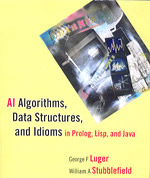
|
FreeComputerBooks.com
Links to Free Computer, Mathematics, Technical Books all over the World
|
|
- Title AI Algorithms, Data Structures, and Idioms in Prolog, Lisp, and Java
- Author(s) George F. Luger, and William A. Stubblefield
- Publisher: Addison-Wesley; 6 edition (September 4, 2008)
- Paperback 464 pages
- eBook PDF files and a single PDF (463 pages, 2.49 MB)
- Language: English
- ISBN-10: 0136070477
- ISBN-13: 978-0136070474
- Share This:

|
This book illustrates how to program AI algorithms in Lisp, Prolog, and Java. The book basically cover each topic 3 times in each language. Topics include: simple production-like system based on logic, logic-based learning, and natural language parsing.
In an inference engine based on first order logic, management of substitutions can get rather complicated, which is often glossed over in AI textbooks. But this book covers this aspect, as do "Paradigms of AI Programming", "Structure and Interpretation of Computer Programs", and Winston's book on Common Lisp
About the Authors- George F. Luger has been a Professor in the University of New Mexico Computer Science, Department since 1979. His two master's degrees are in pure and applied mathematics. He received his PhD from the University of Pennsylvania in 1973, with a dissertation focusing on the computational modeling of human problem solving performance in the tradition of Allen Newell and Herbert Simon.
- Artificial Intelligence, Machine Learning, and Logic Programming
- Algorithms and Data Structures
- Advanced Java Programming
- Prolog Programming
- LISP and Common LISP Programming
- Computer Science

- AI Algorithms, Data Structures, and Idioms in Prolog, Lisp, and Java (George F. Luger, et al)
- The Mirror Site (1) - PDF
- The Mirror Site (2) - PDF
-
 Artificial Intelligence: Structures and Strategies (George F. Luger)
Artificial Intelligence: Structures and Strategies (George F. Luger)
This book captures the essence of artificial intelligence - solving the complex problems that arise wherever computer technology is applied. Readers learn how to use a number of different software tools and techniques to address many challenges.
-
 Practical Artificial Intelligence Programming in Java (Mark Watson)
Practical Artificial Intelligence Programming in Java (Mark Watson)
This book uses both best of breed open source software and the author's own libraries to introduce the reader to Artificial Intelligence (AI) technologies like genetic algorithms, neural networks, expert systems, machine learning, etc.
-
 Artificial Intelligence through Prolog (Neil C. Rowe)
Artificial Intelligence through Prolog (Neil C. Rowe)
This book presents many concepts in artificial intelligence (AI) and problem-solving systems in terms of the Prolog language. Its stated purpose is to provide an informal, hands-on approach to learning AI.
-
 Artificial Intelligence: Foundations of Computational Agents
Artificial Intelligence: Foundations of Computational Agents
This text is a modern and coherent introduction to the field of Artificial Intelligence that uses rational computational agents and logic as unifying threads in this vast field. Many fully worked out examples, expanded coverage on machine learning material, etc.
-
 Robots and AI (Lili Yan Ing, et al)
Robots and AI (Lili Yan Ing, et al)
The book explains new approaches on how robots and artificial intelligence affect the world economy by presenting detailed theoretical framework and country-specific as well as firm-product level-specific exercises.
-
 Mathematical Aspects of Logic Programming Semantics
Mathematical Aspects of Logic Programming Semantics
This book discusses applications of Logic Programming to computational logic and potential applications to the integration of models of computation, knowledge representation and reasoning, and the Semantic Web.
-
 Making AI Intelligible (Herman Cappelen, et al.)
Making AI Intelligible (Herman Cappelen, et al.)
Can humans and artificial intelligences share concepts and communicate? The questions addressed in the book are not only theoretically interesting, but the answers have pressing practical implications.
-
 Artificial Intelligence for a Better Future (Bernd Stahl)
Artificial Intelligence for a Better Future (Bernd Stahl)
This book proposes a novel approach to Artificial Intelligence (AI) ethics. AI offers many advantages: better and faster medical diagnoses, improved business processes and efficiency, and the automation of boring work.
-
 On the Path to AI: Foundations of the Machine Learning Age
On the Path to AI: Foundations of the Machine Learning Age
This book explores machine learning and its impact on how we make sense of the world. It introduces readers to the key concepts of machine learning, discusses the potential applications and limitations of predictions generated by machines using data.
-
 Computers and Thought: An Introduction to Artificial Intelligence
Computers and Thought: An Introduction to Artificial Intelligence
This book provides a unified, self-contained introduction to artificial intelligence for readers with little or no computing background. It presents an original extended AI programming project - the Automated Tourist Guide exercise throughout the main chapters of the text to illustrate the material covered and show how AI actually works.





